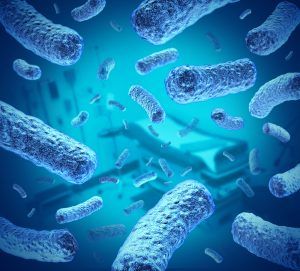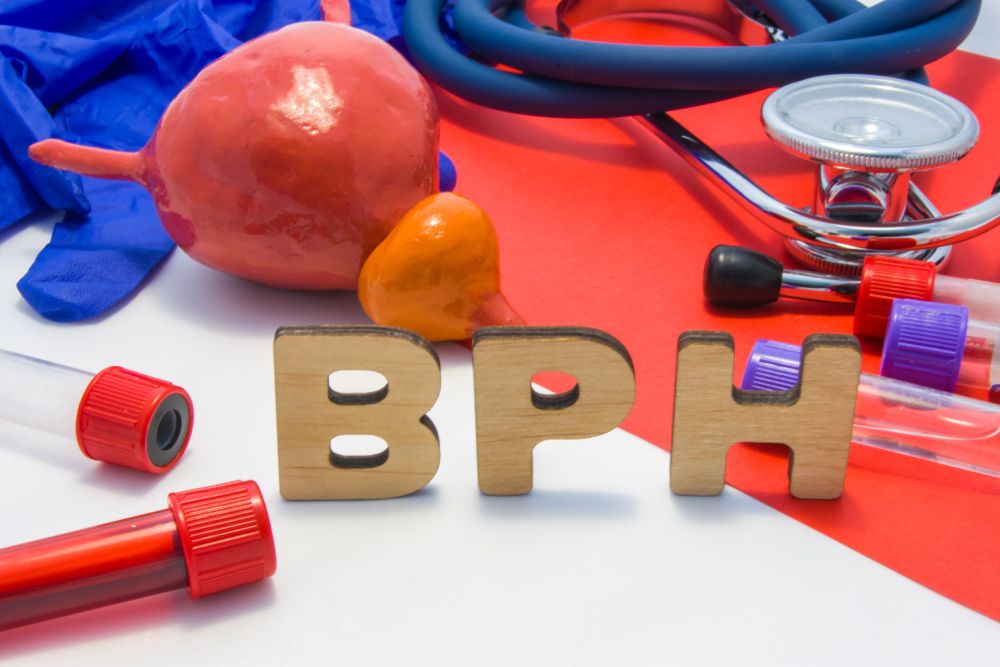The prostate is a gland in men involved in the production of semen. It surrounds the urethra and grows with age. Men typically begin to experience prostate problems around age 50. (Learn More — Prostate Health)
Three main problems tend to be associated with the prostate: benign prostatic hyperplasia (BPH), prostatitis, and prostate cancer. Of these, prostate cancer is usually the most serious. (Learn More — Common Prostate Health Issues)
Each of these three health conditions are treated differently. BPH is usually treated with a combination of alpha-blockers and 5-alpha-reductase inhibitors. Prostatitis requires that the underlying cause is treated, which is typically a bacterial infection (and bacterial infections are fought with antibiotics). Prostate cancer is difficult to treat; it can require surgery, chemotherapy, and other treatments. (Lean More — Treatments for Prostate Health Issues)
Improving prostate health can be achieved with diet changes, maintaining a healthy weight, and getting enough vitamin D.
Some people used to believe ejaculating too much could cause prostate problems, but research suggests the opposite might be true. That said, research is not far enough along for doctors to suggest changing your sex and masturbation habits purely for the sake of prostate health. (Learn More — Improving and Maintaining Prostate Health)
Prostate Health
The prostate is a gland that aids in the production of semen. Unfortunately, it is often the source of many problems in older men. While prostate issues can also occur in younger men, it is significantly less common.
Prostate cancer is so common that the Prostate Cancer Foundation recommends men over a certain age get a screening annually, with the starting age varying slightly depending on the individual.
- Men with a family history of prostate cancer or other prostate problems are recommended to start screenings at 40 years old.
- African Americans (assuming they do not have a family history of prostate issues) are recommended to start screenings around the age of 45, as this population is more likely to develop prostate issues.
- Anyone that does not fall into the two groups should start getting screenings around the age of 50.
Once you hit the age of 55, ask your doctor if you should still get annual screenings.
The prostate surrounds the urethra (the tube that carries urine from the bladder out of the penis) and grows with age. A young man’s is roughly the size of a walnut, whereas people over the age of 50 frequently encounter problems because their prostates grow too large.
Common Prostate Health Issues
While a variety of conditions can affect the prostate, there are three conditions most commonly associated with prostate health problems.
- Benign prostatic hyperplasia (BPH): Benign prostatic hyperplasia is caused by the prostate becoming enlarged enough that it begins to cause uncomfortable urinary symptoms. This can include weak urine flow (which may result in dribbling or accidental mess), frequently needing to urinate (especially at inconvenient times, such as during the night), and the inability to completely empty the
 bladder.
bladder. - Prostatitis: Prostatitis is the swelling and inflammation of the prostate gland. This can cause painful urination and more severe problems, such as flu-like symptoms. It is most common among men who are 50 and younger, and a bacterial infection usually causes it.
- Prostate cancer: The most severe prostate issue, prostate cancer, can potentially be fatal if it is not diagnosed in time. If you experience any problems with urination, blood in your urine or semen, difficulty ejaculating, pressure or pain in your rectum, pain when ejaculating, or pain/stiffness in your back, pelvis, thighs or hips, talk to a doctor.
Treatments for Prostate Health Issues
Once properly diagnosed, there are a few potential treatments for BPH.
- Alpha-blockers: Drugs like alfuzosin (Uroxatral) or doxazosin (Cardura) may be used to relax bladder neck muscles and muscle fibers in the prostate. This makes it easier to urinate. Side effects tend to be mild dizziness and potentially retrograde ejaculation.
- 5-alpha-reductase inhibitors: These drugs, including finasteride (Proscar) and dutasteride (Avodart), cause hormonal changes to prevent prostate growth. They can take up to six months to take effect and can potentially cause retrograde ejaculation.
Retrograde ejaculation is a usually harmless condition where the body essentially ejaculates inward, with semen going into the bladder and little, if any, coming out the tip of the penis. While harmless, this can lead to fertility issues. Talk to your doctor if this is a concern.
Prostatitis treatment generally focuses on addressing the root of the inflammation. Luckily, bacterial infections tend to be relatively easy to treat. Your doctor will prescribe antibiotics, and your symptoms should go away.
Treatment for prostate cancer needs to adapt to a patient’s needs. In some cases, prostate cancer will spread outside the prostate, in which case the patient is in greater danger and will need more extensive treatment. A prostate cancer patient may need surgery, chemotherapy, and other therapies.
Survival rates among prostate cancer patients are fairly high.
Improving and Maintaining Prostate Health
A healthy diet and weight can help to improve your prostate health. Eat a diet low in fat, with many fruits and vegetables, while also trying to cut dairy. Some studies have shown a link between high dairy consumption and poor prostate health. A balanced diet can help your prostate and improve your overall physical well-being.
 While too much sunlight is associated with skin cancer, the vitamin D we get from the sun can actually reduce your chances of prostate cancer. However, it is essential to continue using caution by wearing sunscreen and sunglasses as needed.
While too much sunlight is associated with skin cancer, the vitamin D we get from the sun can actually reduce your chances of prostate cancer. However, it is essential to continue using caution by wearing sunscreen and sunglasses as needed.
It used to be thought that ejaculation could increase your risk of prostate cancer, but the opposite actually seems to be the case. While research is not yet conclusive, and it is too early to recommend lifestyle changes, one study found that frequent ejaculation (either via sex or masturbation) can improve prostate health.
Considering this was only found in one study, more research is needed. Talk to your doctor before making any lifestyle adjustments.
References
Tips for Keeping a Healthy Prostate. John Hopkins Medicine.
Prostate Problems. (March 5, 2019). WebMD.
Prostate Cancer Prevention: Ways to Reduce Your Risk. (November 6, 2018). Mayo Foundation for Medical Education and Research (MFMER).
Prostate Health & Disease. Harvard Health Publishing.
Frequent Ejaculation May Be Good for Prostate. (April 6, 2004). WebMD.
Benign Prostatic Hyperplasia (BPH): Diagnosis & Treatment. (March 2, 2019). Mayo Foundation for Medical Education and Research (MFMER).
Benign Prostatic Hyperplasia (BPH): Symptoms & Causes. (March 2, 2019). Mayo Foundation for Medical Education and Research (MFMER).
Should I Be Screened? Prostate Cancer Foundation.
Prostatitis: Symptoms & Causes. (May 16, 2018). Mayo Foundation for Medical Education and Research (MFMER).
Prostate Cancer Symptoms and Signs. Prostate Cancer Foundation.
Prostate Cancer: Diagnosis & Treatment. (April 17, 2019). Mayo Foundation for Medical Education and Research (MFMER).
Prostate Cancer Survival Rates. Prostate Cancer Foundation.


 bladder.
bladder.




